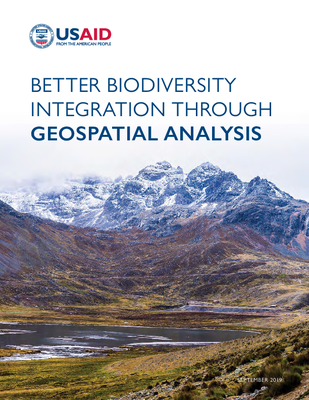Better Biodiversity Integration Through Geospatial Analysis
This guide describes the use of geospatial analysis for integrating biodiversity conservation with other development sectors at USAID. It consists of four chapters corresponding to the four stages of the program cycle and provides the why, when and how of using geospatial analysis, including the rationale for the use of geospatial data and analysis, enabling conditions, best practices, and an example from USAID programming. This work represents a joint effort of the USAID Office of Forestry and Biodiversity and the Bureau of Latin America and the Caribbean’s Environment Team and provides a starting point for USAID staff in incorporating geospatial analysis into their own work.
https://biodiversitylinks.org/projects/completed-projects/bridge/bridge-resources/better-biodiversity-integration-through-geospatial-analysis/view
https://biodiversitylinks.org/projects/completed-projects/bridge/bridge-resources/better-biodiversity-integration-through-geospatial-analysis/@@download/image/image.png
File
Better Biodiversity Integration Through Geospatial Analysis
Author(s):
Mark Higgins, Biodiversity Results and Integrated Development Gains Enhanced (BRIDGE)
Publication Date: 2019
Location: Latin America, The Caribbean
DOWNLOAD FILE
This guide describes the use of geospatial analysis for integrating biodiversity conservation with other development sectors at USAID. It consists of four chapters corresponding to the four stages of the program cycle and provides the why, when and how of using geospatial analysis, including the rationale for the use of geospatial data and analysis, enabling conditions, best practices, and an example from USAID programming. This work represents a joint effort of the USAID Office of Forestry and Biodiversity and the Bureau of Latin America and the Caribbean’s Environment Team and provides a starting point for USAID staff in incorporating geospatial analysis into their own work.



